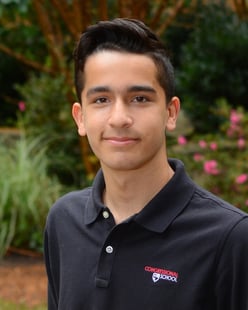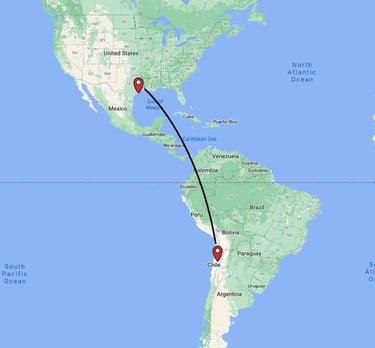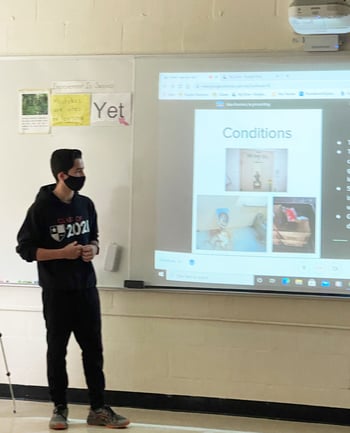Written By: Javier '21 as a part of his 8th Grade Capstone Project
The views expressed in this article are those of the author and are not necessarily reflective of the position or policy of Congressional School.

My name is Javier, and I am an eighth grader at Congressional School. For my Capstone project, I have chosen to focus on the conditions in immigrant detention facilities and the treatment faced by detainees. I chose this topic because people must endure horrible conditions in U.S. immigrant detention facilities, but the issue is not prominent in people’s minds. I thought that the best way to raise awareness of this topic was to share one’s experience of being detained. In February, I had the privilege to interview a man who had recently been detained at an airport for about 14 hours. He has given me permission to share his story. The person who I have interviewed would prefer for his identity to not be disclosed. Throughout the article, he will be referred to as “Miguel.” His story follows...
A Note from Congressional School: The following story was compiled from an interview conducted by Javier completely in Spanish. The story is written by Javier, including the italicized portions below.
The Story of Miguel
Last year in December, my uncle invited me to spend the winter holidays with my family who lives in the United States. There was nothing to do in Chile due to the fact that everything was shut down because of the pandemic, so I gladly accepted. I packed up my things, acquired a visitors visa, and left for the U.S. When I arrived in Houston at 5:30 a.m., I encountered American immigration officers. The officers proceeded to question me about the last time I came to the U.S. I had visited my family regularly in the past and had come to visit them for a few months earlier that year. When the officers asked if I had brought any money with me, I told them that I had $4000 that my uncle’s brother had given me. Immediately after I said this, the officers asked if I had any work in the U.S., to which I honestly replied, “No.” They accused me of being a liar. Confused, I repeated that the only work I had was in Chile.
When Miguel informed the immigration officers about the $4000, they became suspicious of his intentions for coming to the U.S. They did not understand why he would bring so much money if he was only going for vacation. The officers began to suspect that he was coming to work in the U.S. illegally. Miguel reiterated the fact that he was only coming to the U.S. to visit his family.
One of the officers told me to accompany them to a room as they checked my passport and visa. I followed them, perturbed. I have been visiting my family for six years, and I have never been directed to such a room before. I had nothing with me except my cell phone. There were no windows, and the room was full of other people. For what seemed to be a room meant for up to 50 people, there were 90 others inside with me. The few seats in the room were already taken when I entered, so I was forced to sit on the ground next to the other people huddled shoulder-to- shoulder. Even in the height of the pandemic, it was apparent that the officers made no effort to take precautions against COVID-19. There was not enough space for everyone to stand six feet apart. One by one, people were getting called up to receive their passports and leave. I knew that I was not supposed to be there, but all I could do was wait.
 At approximately 9:30 a.m., a Latino immigration officer came to get me for more questions. I wasn’t feeling scared at the moment because I knew I had nothing to hide, but the officer didn’t see it that way. He sat me down and told me, “I know that you’ve already lied to the other officers, so I’m going to need you to tell me the truth. You’re going to be sent back to Chile, so don’t come at me with any games.” I sat there motionless, not knowing what to say at that point. The officers had all repeatedly asked me about my work, and I had given them the same truthful answer every time. But they did not believe me when I told them that I had no work in the U.S., and now I wasn’t going to be allowed into the country. They would continually reiterate the statement, and I would repeat that I had no work in the U.S. It felt as if they were psychologically torturing me to admit the “real reason” that I came. The Latino officer said that he wasn’t going to put words in my mouth, but that is exactly what he did. He sent me back to the room after I hadn’t given him the answer that he wanted. I was now afraid.
At approximately 9:30 a.m., a Latino immigration officer came to get me for more questions. I wasn’t feeling scared at the moment because I knew I had nothing to hide, but the officer didn’t see it that way. He sat me down and told me, “I know that you’ve already lied to the other officers, so I’m going to need you to tell me the truth. You’re going to be sent back to Chile, so don’t come at me with any games.” I sat there motionless, not knowing what to say at that point. The officers had all repeatedly asked me about my work, and I had given them the same truthful answer every time. But they did not believe me when I told them that I had no work in the U.S., and now I wasn’t going to be allowed into the country. They would continually reiterate the statement, and I would repeat that I had no work in the U.S. It felt as if they were psychologically torturing me to admit the “real reason” that I came. The Latino officer said that he wasn’t going to put words in my mouth, but that is exactly what he did. He sent me back to the room after I hadn’t given him the answer that he wanted. I was now afraid.
I discreetly pulled out my phone to contact my family after I arrived again in the crowded waiting room. I called my uncle to tell him that I wasn’t going to be able to make it, as I was going to be sent back to Chile. An officer saw me with my phone, so he walked up to me and ordered me to give it to him. He put the phone in a small bag when I gave it to him. He said in a cavalier tone, “You people never understand,” as if I was a part of some unruly group that doesn’t follow rules. The officer left for a while to talk to my uncle on the phone. When he came back, he said to me, “How can I believe your uncle now that you’ve contacted him?” I told the officer how to get into my phone to show him that I was telling the truth, but the officer did not check it, assuring that they would not be proven wrong in their claim.
It was now around 4:00 p.m., and I had had many other, similar conversations with the immigration officers about my “work” in the U.S. Every four hours or so, we were given Maruchan soup and juice as meals, but there were times when I couldn’t eat. I did not know the exact time because I had no watch. I didn’t even have the Sun to estimate the time. Part of me didn’t even want to know the time because I was afraid that it would make the time pass by slower.
|
Javier sharing his Capstone with |
Miguel’s uncle called the immigration officers back with a lawyer a short while later. The officer responded with, “We don’t talk with lawyers.” He hung up, and then called Miguel to talk once again. This meeting, however, was different from the others he had had before. The officers sat him down and told him that he had two options: 1) To be put on a bus and sent to an American jail, or 2) to board the next plane back to Chile and be deported.
I returned to the room once again, having done everything that I could do. I had been telling the immigration officers the truth about why I was visiting the U.S., and my uncle even called them with a lawyer. They still would not listen, because they only heard what they wanted to hear. All of my life I had fought until I couldn’t anymore, but these officers forced me to throw in the towel. The only thing that I could do at that moment was to wait for the commissioner of the area to decide my case. Neither of the two options presented were outcomes that I wanted, but I had not been able to sleep since 5:30 a.m. when I arrived, and I just wanted this ordeal to end.
A little while later at about 7:00 p.m., I was called in to sign forms and swear an oath. I did not know what I was signing because I was not given a chance to read them, and the documents were also in English. Out of worry, I asked if I was going to be sent to jail. An officer looked at me and shook his head. I let out a sigh of relief. It took me a moment before I realized that that meant I was going to be sent back to Chile. Before I was put on the plane, they took my DNA and my profile, like they would a criminal. Two officers escorted me to the plane. Once I was on, they gave me back my phone and my other belongings. They had given my passport to a flight attendant and told me to ask them for it upon arriving in Chile. Once we were at 10,000 feet in the air, I connected to the plane’s WiFi to assure my family that I was okay, and that I was going back to Chile. It was 11:45 p.m. when I finished the dinner the airline offered me. I finally felt calm. There was no more dread of what was to come, no more interrogations, and no more sitting in the crowded room of other people. I shut my eyes and finally fell asleep.
After Miguel shared his story, I asked him whether his views on the United States had changed after his experience.
To be honest, no. I have been visiting the United States for a long time, and I have gotten a good sense of it every time I visit my family. But I am a 30 year old Latino with no wife or children. I fit the profile of how they view people who come to the United States to work illegally. I was obviously only visiting to celebrate the holidays with my family, but people don’t assume that when they see me. The officers stopped me and, based on nothing but my profile, assumed I was there to illegally work. It just happened to be bad luck.
Miguel’s visa was cancelled, and he was not able to see his family. His story is important because we only hear of immigrants being treated badly at the border. Many people assume this only happens to people who have no papers and who want to enter and stay in the U.S. illegally. But Miguel had a passport and a visitor’s visa, yet he was still stopped and treated like a criminal. While the topic of our immigration system is highly debated, it is clear that our country must work to better the treatment these people receive.

Written by:
Javier '21
Grade 8 Student at Congressional School







